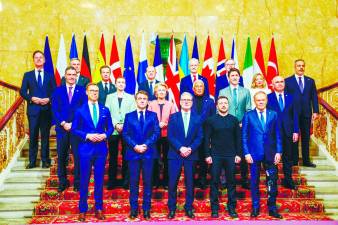PERHAPS the most cynicism-producing event of the year was the rush by seven European leaders to Washington to lend support to President Volodymyr Zelenskyy for his meeting with President Donald Trump, following the latter’s summit meeting with Russian President Vladimir Putin to try to end the war in Ukraine.
European leaders joining the meeting included United Kingdom Prime Minister Keir Starmer, Italian Prime Minister Giorgia Meloni, French President Emmanuel Macron, German Chancellor Friedrich Merz, Finnish President Alexander Stubb, President of the European Commission Ursula von der Leyen and Nato Secretary-General Mark Rutte.
During the press conference after the meeting, each European leader engaged in opportunistic posturing and public-attention-grabbing speeches to proclaim their support for a peace settlement.
The live event recording suggests that their public rhetoric, while supportive of Ukraine, in reality reflects underlying self-interested goals rather than an altruistic or pragmatic commitment to helping resolve the conflict.
Unlike Trump, who is determined to bring about an end to the bloody and prolonged war, the European Union and United Kingdom policies have been and continue to be fixated on bringing about Moscow’s, that is, Putin’s capitulation even if it means thwarting any concessions that Zelenskyy is being encouraged to make by Trump.
The Western European insistence on “fighting to the last Ukrainian” can be clearly discerned during the 2024 clash in the EU parliament when von der Leyen criticised Hungarian Prime Minister Viktor Orban for calling for an immediate ceasefire and proposing that a deal may involve some concessions to Russia.
Orban’s position was based on the reality that the war is a military and economic drain on Europe and that the priority should be to stop the fighting, even if it means a less than ideal outcome for Ukraine.
Among the European leaders, he has been the outstanding advocate of a settlement that can produce a lasting and durable peace.
UK role as a war monger
Analysts following the origins of the war and development during its early stages have noted similar opportunistic encouragement of the war by the UK government, although the UK is not a continental European nation and is not being threatened in any way by Russia’s war in Ukraine.
Former prime minister of the UK Boris Johnson has been the most prominent early cheerleader for the war, visiting Kyiv multiple times during his tenure.
Pushing the UK to be consistently ahead of other European nations in supplying offensive weaponry and in urging Zelenskyy to commit his country to a long, grinding war of attrition, Johnson’s domestic critics have accused him of using the war to resurrect his tattered political image and to solidify a legacy after the “Partygate scandal”.
His successor, Rishi Sunak, intensified the UK’s policy under Johnson and can be said to have even more blood on his hands. Under him, the UK was the first country to pledge and provide Western main battle tanks and long-range precision strike missiles, which were significant escalations in capability.
By providing weapons that enabled Ukraine to strike deep behind Russian lines, Sunak encouraged a prolonged and expanded conflict.
Starmer, although leading a Labour-party government, has continued (as with his Conservative party counterparts) to believe that it is in the interest of his party and the country to invest strongly in a Russian defeat, which would engineer a geopolitical and economic outcome for Britain similar to the post-Soviet “gold rush” of the 1990s.
The core of this cynical “make Britain great again” hypothesis – making a killing from a collapse – and seldom publicly discussed by UK leaders and the British media sees a strategic economic opportunity in a Russian defeat, alongside the geopolitical gains.
The model is the chaotic breakup of the Soviet Union, which led to a massive capital flight as Russian oligarchs and well-connected businessmen, fearing instability and seizure of assets, scrambled to get their wealth out of the collapsing state.
British and other Western European political and economic interests are hoping to reap a bonanza should Russia collapse or Putin be overthrown as an outcome of the war’s end.
Trump rebuffs Western European war strategy
Unfortunately for the EU and UK agitators of the “fighting to the last Ukrainian” strategy, Trump has rejected their hardline policies.
Instead, he has adopted the Hungarian president’s argument that any peace plan that contains the EU’s maximum demands, including Nato’s further expansion into Ukraine, is only prolonging the conflict.
Most independent analysts agree with Trump that a diplomatic solution, even an imperfect one, is the only way to save lives and prevent further destruction. The EU and UK’s “all or nothing” approach prevents this. More importantly, the EU’s insistence on full territorial integrity is unrealistic, given the military situation on the ground.
The statements by European leaders trumpeted by the Western media should be reassessed for their actions beyond the immediate press conference.
While their words may be about compassion and peace, their policies are shaped by opportunistic considerations of power, security, domestic politics and self-interest.
The public display of a united front with Ukraine can be seen as a strategic tool to secure their own interests and present a favourable image to international partners and domestic audiences and not because they have the best interests of Ukraine and Ukrainians at heart.
Lim Teck Ghee’s Another Take is aimed at demystifying social orthodoxy. Comments: letters@thesundaily.com
